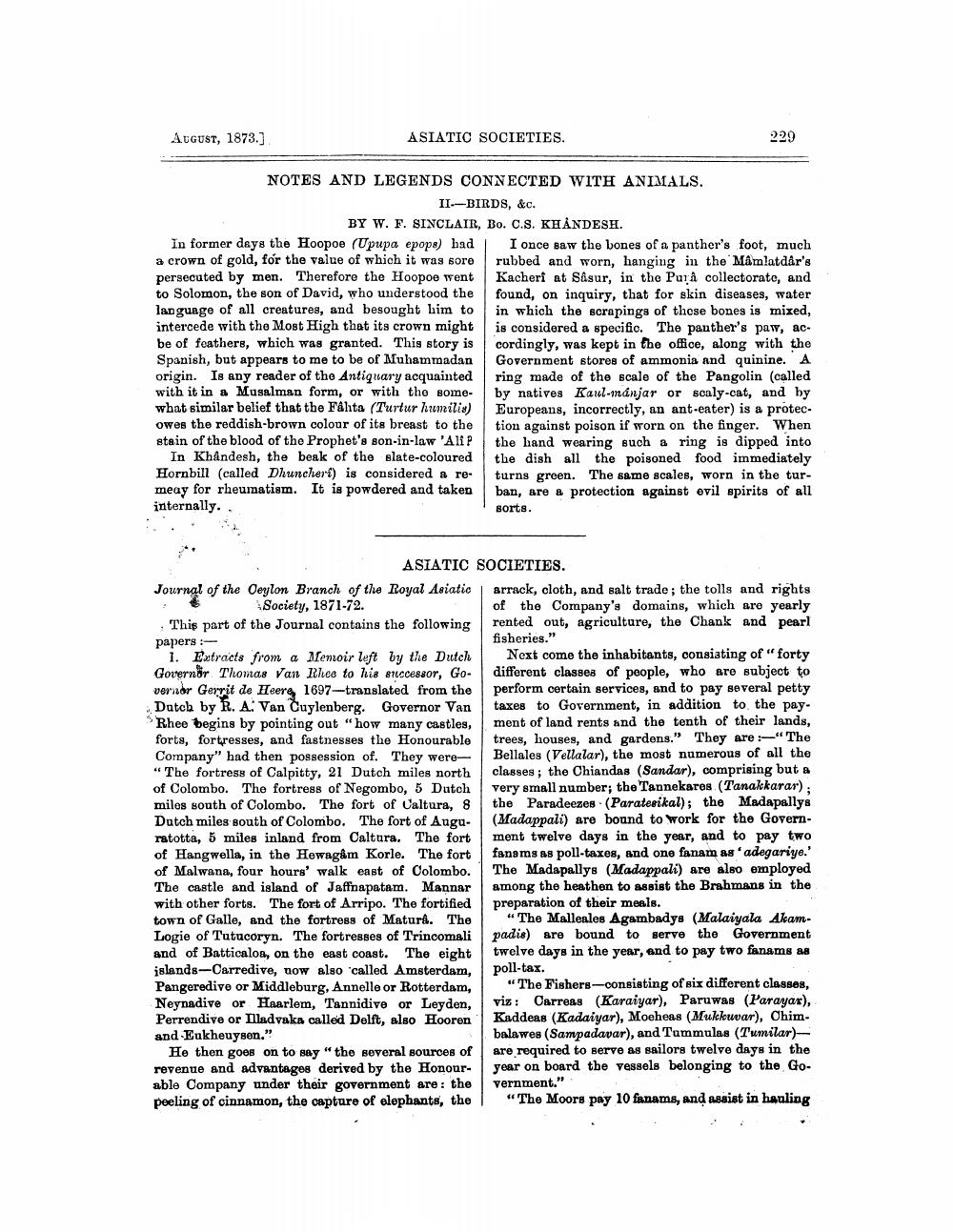________________
AUGUST, 1873.]
ASIATIC SOCIETIES.
229
NOTES AND LEGENDS CONNECTED WITH ANIMALS.
II.-BIRDS, &c.
BY W. F. SINCLAIR, Bo. C.S. KHÅNDESH. in former days the Hoopoe (Upupa epops) had I once saw the bones of a panther's foot, much a crown of gold, for the value of which it was sore rubbed and worn, hanging in the Mamlatdar's persecuted by men. Therefore the Hoopoe went Kacheri at Sasur, in the Pura collectorate, and to Solomon, the son of David, who understood the found, on inquiry, that for skin diseases, water language of all creatures, and besought him to in which the scrapings of these bones is mixed, intercede with the Most High that its crown might is considered a specific. The panther's paw, acbe of feathers, which was granted. This story is cordingly, was kept in the office, along with the Spanish, but appears to me to be of Muhammadan Government stores of ammonia and quinine. A origin. Is any reader of the Antiquary acquainted ring made of the scale of the Pangolin (called with it in a Musalman form, or with the some- by natives Kaul-mánjar or scaly-cat, and by what similar belief that the Falta (Turtur humilis) Europeans, incorrectly, an ant-eater) is a protecowes the reddish brown colour of its breast to the tion against poison if worn on the finger. When stain of the blood of the Prophet's son-in-law 'Ali? the hand wearing such a ring is dipped into
In Khandesh, the beak of the slate-coloured the dish all the poisoned food immediately Hornbill (called Dhuncheri) is considered a re- turns green. The same scales, worn in the turmeay for rheumatism. It is powdered and taken ban, are a protection against evil spirits of all internally.
sorts.
ASIATIC SOCIETIES. Journal of the Ceylon Branch of the Royal Asiatic i arrack, cloth, and salt trade; the tolls and rights Society, 1871-72.
of the Company's domains, which are yearly This part of the Journal contains the following rented out, agriculture, the Chank and pearl papers :
fisheries." 1. Extracts from a Menoir left by the Dutch Next come the inhabitants, consisting of " forty Governor Thomas Van Rhee to his successor, Go- different classes of people, who are subject to vernor Gerrit de Heere 1697-translated from the perform certain services, and to pay several petty Dutch by R. A. Van Cuylenberg. Governor Van taxes to Government, in addition to the pay. Rhee begins by pointing out "how many castles, ment of land rents and the tenth of their lands, forts, fortresses, and fastnesses the Honourable trees, houses, and gardens." They are :-"The Company" had then possession of. They were Bellales (Vellalar), the most numerous of all the "The fortress of Calpitty, 21 Dutch miles north classes; the Chiandas (Sandar), comprising but a of Colombo. The fortress of Negombo, 5 Dutch very small number; the Tannekares (Tanakkarar): miles south of Colombo. The fort of Caltura, 8 the Paradeezes (Paratesikal); the Madapallys Dutch miles south of Colombo. The fort of Augu- (Madappali) are bound to work for the Governratotta, 5 miles inland from Caltura. The fort ment twelve days in the year, and to pay two of Hangwella, in the Hewagâm Korle. The fort fanams as poll-taxes, and one fanam as'adegariye.' of Malwana, four hours' walk east of Colombo. The Madapallys (Madappali) are also employed The castle and island of Jaffnapatam. Mannar among the heathen to assist the Brahmans in the with other forts. The fort of Arripo. The fortified preparation of their meals. town of Galle, and the fortress of Mature. The "The Malleales Agambadys (Malaiyala AkamLogie of Tutucoryn. The fortresses of Trincomali padis) are bound to serve the Government and of Batticaloa, on the east coast. The eight twelve days in the year, and to pay two fanams as islands-Carredive, now also called Amsterdam, poll-tax. Pangeredive or Middleburg, Annelle or Rotterdam,
"The Fishers-consisting of six different classes, Neynadive or Haarlem, Tannidive or Leyden, viz: Carreas (Karaiyar), Paruwas (Parayar), Perrendive or Illadvaka called Delft, also Hooren
Kaddeas (Kadaiyar), Moeheas (Mulhuar), Ohimand Eukheuysen."
balawes (Sampadavar), and Tummulas (Tumilar) He then goes on to say "the several sources of are required to serve as sailors twelve days in the revenue and advantages derived by the Honour
year on board the vessels belonging to the Goable Company under their government are: the vernment." peeling of cinnamon, the capture of elephants, the "The Moors pay 10 fanams, and assist in hauling




